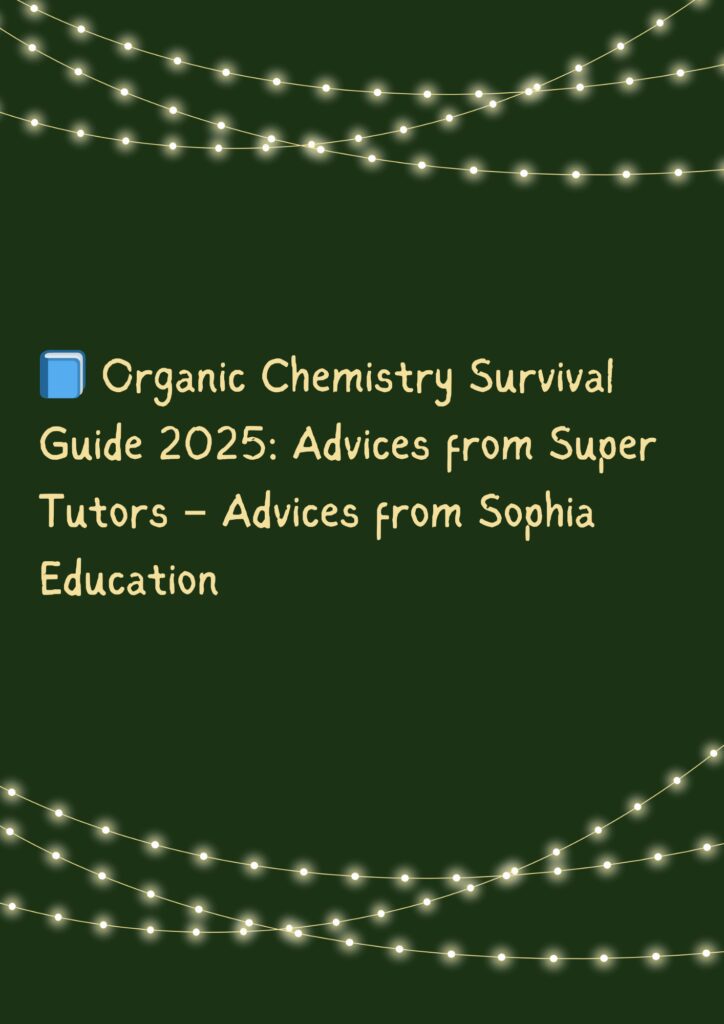📘 Organic Chemistry Survival Guide 2025: Advices from Super Tutors
By Sophia Education – Helping Your Child Master Organic Chemistry!
Introduction: Why Organic Chemistry Can Be Challenging for Students
Organic Chemistry is often considered one of the more challenging subjects in the curriculum for students, particularly at the JC (Junior College) level. With its complex structures, mechanisms, and a variety of reactions, many students find themselves struggling to grasp concepts fully. However, with the right guidance and strategies, Organic Chemistry can become an exciting subject that your child will master with confidence! 🎓
What You Can Expect in This Guide:
-
🔬 Clear, easy-to-understand explanations for key topics.
-
🎯 Study strategies to boost retention and understanding.
-
📝 Practical tips for exam success.
-
💡 How to support your child during their Organic Chemistry journey.
Let’s dive in and make Organic Chemistry less intimidating and more enjoyable for your child! 🧑🔬

Understanding Organic Chemistry: What’s Inside?
Before we dive into study strategies, it’s important to understand the key areas your child will cover in Organic Chemistry. Here’s an overview of the core topics:
1. Structure and Bonding
-
Molecular Structure: Understanding how atoms bond to form molecules is fundamental.
-
Functional Groups: Recognizing and understanding different functional groups such as alcohols, amines, and carboxylic acids.
-
Isomerism: The study of molecules that share the same formula but differ in their structure or arrangement.
2. Reactions and Mechanisms
-
Reaction Mechanisms: How and why certain reactions occur, including nucleophilic substitution, elimination, and addition reactions.
-
Types of Reactions: From oxidation reactions to electrophilic additions, each reaction has its own set of rules.
-
Reactivity Trends: How different molecules react under certain conditions and why.
3. Synthesis and Functional Group Transformation
-
How to transform one functional group into another through different chemical reactions.
Step 1: Building a Strong Foundation – Don’t Skip the Basics!
As a parent, you can help your child by ensuring that they build a strong foundation in the basics of Organic Chemistry. Many students try to rush through the basic concepts in hopes of getting to the ‘advanced’ topics. But understanding fundamental principles such as molecular structure, bonding, and functional groups is essential for success in Organic Chemistry.
💡 Tip for Parents:
Encourage your child to spend time understanding the periodic table, bonding, and the different functional groups. They should be able to identify functional groups quickly and relate them to their corresponding reactions. This is a skill that will serve them throughout their study of Organic Chemistry.
Step 2: Identifying Strengths and Weaknesses – The Power of Self-Assessment
It’s crucial for students to regularly assess their understanding of each topic. Regular self-assessment helps pinpoint the areas they find difficult and need to revisit.
📊 Study Strategy:
-
Use flashcards to help with functional group recognition and reaction mechanisms.
-
After each chapter, students should attempt practice questions, especially ones that they struggled with in the past.
-
Error analysis: Go over any mistakes in practice tests and understand why the mistake occurred.
💡 Tip for Parents:
Help your child create a study journal where they note down mistakes made during practice. Revisiting these mistakes each week and ensuring they understand where they went wrong will increase retention and boost their confidence. 📖
Step 3: Creating a Study Plan – How to Stay On Track
A structured study plan is key to mastering Organic Chemistry. Your child should have a clear understanding of the chapters they need to cover, their strengths, and areas that need improvement.
Here’s an example of a 3-Month Study Plan:
| Week | Topics to Cover | Focus Areas | Additional Activities |
|---|---|---|---|
| 1-2 | Structure and Bonding | Functional Groups, Isomerism | Watch short videos on bonding and structure. |
| 3-4 | Organic Reactions (Nucleophilic Substitution) | Reaction Mechanisms, Mechanistic Pathways | Complete practice problems on reactions. |
| 5-6 | Synthesis and Functional Group Transformation | Reactivity Trends | Do mock exams and go over mistakes. |
| 7-8 | Alcohols, Aldehydes, and Ketones | Functional Group Transformations | Use concept maps to connect related reactions. |
| 9-10 | Aromatic Compounds & Polymers | Detailed study of Aromatics | Practice multi-step synthesis problems. |
| 11-12 | Revision and Practice Exams | Focus on weak areas | Take full-length practice exams under timed conditions. |
💡 Tip for Parents:
Help your child organize their study time using study apps or Google Calendar to break down tasks and keep track of progress. Timely revision and proper planning are crucial! 📅
Step 4: Active Learning – Engage with Organic Chemistry!
One of the best ways to learn Organic Chemistry is to actively engage with the material. Students should go beyond passive reading and actively apply the concepts they are learning. This could mean solving problems, teaching a concept to a peer, or using models to visualize molecules and reactions.
🧑🔬 Study Tip:
-
Draw Reaction Mechanisms: Encourage your child to draw out reaction mechanisms on paper. This helps reinforce their understanding and ensures they don’t just memorize the steps but understand them.
-
Use Molecular Models: 3D molecular models can help your child visualize how atoms and bonds interact. Many apps are available to assist with this visual learning process.
💡 Tip for Parents:
Encourage your child to explain concepts to you or even teach a peer. Teaching forces students to clarify their understanding and often helps reinforce what they’ve learned.
Step 5: Exam Strategies – Stay Calm and Confident!
Organic Chemistry exams are a test of both knowledge and problem-solving skills. Your child will be asked to not only recall facts but also apply their knowledge to new situations.
📖 Exam Tip:
-
Focus on Mechanisms: In exams, students should focus on reaction mechanisms and not just memorize them. Explaining each step in the mechanism is crucial.
-
Practice Timed Papers: Encourage your child to take timed mock exams, focusing on reaction mechanisms and functional group transformations.
💡 Tip for Parents:
Provide a calm and distraction-free environment when your child is doing practice papers. Avoid cramming in the last minute and focus on smart revision instead of last-minute panic. 🧘♂️
Step 6: Using Resources Wisely – What Are the Best Tools?
There are many resources available to help students learn Organic Chemistry effectively. However, it’s essential to know which tools are most effective.
Books:
-
Textbooks: The main textbook provided by the school should be the first go-to resource.
-
Reference Books: Books like “Organic Chemistry as a Second Language” by David Klein are great for breaking down complex topics into simpler explanations.
Online Platforms:
-
YouTube Channels: Channels like Khan Academy, CrashCourse, and Organic Chemistry Tutor are excellent for video explanations.
-
Flashcard Apps: Use apps like Quizlet to create flashcards for functional groups, reactions, and terms.
-
Mobile Apps: Apps like ChemDoodle or ChemSketch can help visualize molecules and reactions.
💡 Tip for Parents:
Encourage your child to use visual aids and mobile apps, but limit distractions from social media. Finding the right balance between study resources and distractions is crucial!
Final Words – Success is Within Reach!
Organic Chemistry is challenging, but with consistent effort, the right strategies, and regular practice, your child can master it. Stay positive, be patient, and support them along their journey. The key to success in Organic Chemistry lies in understanding concepts, practicing regularly, and staying calm during exams.
📈 Remember: Consistency is key, and Organic Chemistry is just one step in your child’s educational journey. They may encounter difficult moments, but with perseverance and the right approach, they’ll come out on top!
💡 Tip for Parents:
Stay involved in your child’s learning journey and encourage open discussions about their progress. Help them set achievable goals and celebrate their wins, no matter how small.
Together, we can ensure that Organic Chemistry becomes not a subject of fear, but one of mastery and success. 🚀




